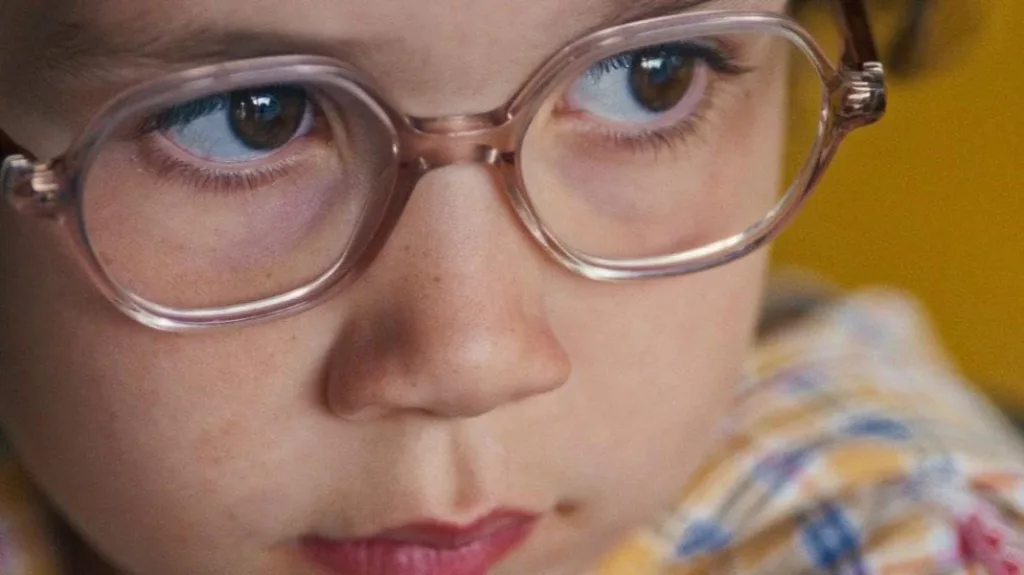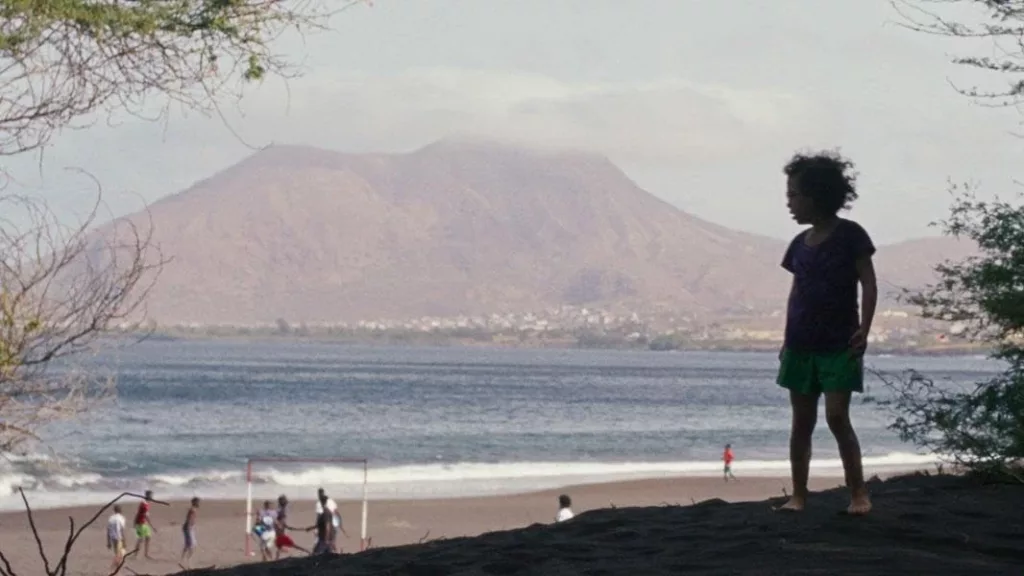We’re introduced to a young girl named Cléo, who lives in Paris with her father after losing her mother at a young age. Her nanny Gloria has been by her side for almost as long as she can remember, providing love and care. Gloria is originally from Cape Verde, but one day she receives tragic news: her own mother has passed, and Gloria must return home permanently to be there for her family.
This upsets the stable life little Cléo has known. To help ease the transition, her father arranges for her to visit Gloria in Cape Verde for the summer, hoping it will help the two adjust to their new circumstances. But Cléo struggles amid this change as she begins to understand that Gloria has commitments of her own. Living now in Gloria’s world, Cléo encounters relationships, traditions, and cultures unfamiliar to her. Through it all, she and Gloria must navigate how to say goodbye after so many years together.
Directed by Marie Amachoukeli, the film follows this journey with care and nuance. Anchored by deeply moving performances from its young leads, it explores how both Cléo and Gloria learn what it means to grow up and experience separation. A tale of empathy, it illuminates the challenges of these formative life transitions in a sensitive yet resonant way.
Stories of Family
Let’s meet our main characters. Little Cléo has lived in Paris her whole life with her father after losing her mother at a young age. Her nanny, Gloria, fills that maternal role, caring for Cléo since she was an infant. Gloria was originally from the island nation of Cape Verde, but she moved to help provide for her children back home.
Tragedy strikes when Gloria learns her own mother in Cape Verde has died. Knowing her family needs her, Gloria makes the difficult decision to return permanently. This upends Cléo’s world, as she relies heavily on Gloria. Not wanting to separate them completely, Gloria arranges for Cléo to visit Cape Verde for the summer.
When Cléo arrives, she finds Gloria’s life more complicated than she realized. Gloria must care for her teenage daughter Fernanda, who is pregnant, and her son César, around Cléo’s age. César resents Cléo for the time she spent with his mother in France. We also learn Gloria is building a hotel, hoping to create opportunities for her community.
The cultural differences in Cape Verde challenge Cléo’s sense of security. She must adjust amid these new dynamics within Gloria’s family. Through it all, the film explores how Cléo and Gloria navigate their bond as belonging to two worlds threatens to pull them apart.
Bonds between Worlds
Our focus shifts to the characters at the heart of this story. Little Cléo remains deeply attached to Gloria—all she’s ever known of motherly love. Yet coming to Cape Verde opens her eyes to dependencies she never realized. Cléo feels lost without Gloria’s constant presence, confused by new rules in this unfamiliar place.
Gloria herself juggles commitments like few others. She cares for Cléo with a mother’s devotion, despite distance. But her own family also demands attention, with needs Gloria spends years providing for from abroad. We see both the sacrifices of her role and her strength in wanting the best for everyone. Her children question how present she can truly be after so long.
The relationship between Cléo and Gloria evolves in interesting ways on this visit. Cléo pushes boundaries, acting out of fear of being replaced. Gloria teaches valuable lessons about sharing love with others. Over time, Cléo gains perspective, understanding her place in a bigger story. Their bond remains deeply caring but takes on maturity as both find their way in separate worlds, increasingly pulling them apart.
The film skillfully lays bare the honest, sometimes messy realities within families and how roles like parent and child seldom adhere to simple definitions. It’s a subtle portrayal of individuals navigating vulnerability with grace through a relationship at its heart.
Crafting Complexity
This story stems from the vision of director Marie Amachoukeli, who navigates intricate layers with grace. She explores each character’s perspective with nuance, highlighting cultural differences while fostering shared humanity. Through subtle artwork, Amachoukeli also finds ways to express what words cannot for young Cléo.
Central to bringing this world alive are the performances. As Cléo, Louise Mauroy-Panzani commands the screen with raw emotion. Though just a child, she conveys complex stakes in a way that is deeply moving. Ilça Moreno Zego also shines as Gloria, capturing a woman who balances immense love with life’s complicated demands. The bond between these two feels authentic, anchoring the thoughtful themes.
Imaginative animation sequences further enrich the narrative. They share private moments from Cléo’s viewpoint, whether treasured memories or fears that it is too difficult for a six-year-old to speak. This storytelling tool helps internal experiences feel visceral. It also provides respite from the relentless intimacy of live action.
Under Amachoukeli’s guidance, all contributions come together seamlessly. Though some wish for deeper exploration of certain parts, the whole remains greater than its parts. In Àma Gloria, mastery and meaning meet to craft a rare piece of cultural understanding.
Navigating New Horizons
This story teaches some profound life lessons. It portrays how parental figures leave their mark, as seen through Cléo’s bond with Gloria, which has developed since infancy. Yet it also shows how attachment must change as one discovers those closest have duties beyond themselves.
Cléo faces this difficulty when separated from comforts in Gloria’s homeland, where differences appear. New cultures, relationships, and roles challenge Cléo’s security. Her struggles highlight questions we all ask as the world expands beyond its first limits. How does one embrace more than place or person?
Amachoukeli treats growing pains with sensitivity. She depicts recognizing loved ones have lives beyond what we see, as Gloria must for another family once cared for, just as Cléo was. Only through turmoil does the young girl gain insight; others exist with purposes beyond our view.
The film resonates through applicable life lessons beyond characters. We all accept that change defines life, as near connections transform and independence replaces childhood reliance. A story of intimate bonds, Àma Gloria finds deeper meaning in navigating how connections endure through new horizons.
Windows into the Soul
This film invites comparison to works exploring profound bonds. Celine Sciamma’s Petite Maman portrays childhood in a fantastical light, while Àma Gloria achieves intimacy through grounded authenticity in its young leads.
Through Cléo’s eyes, we experience separation’s confusion and growth’s difficulties with visceral empathy. Yet solely seeing events from her perspective risks overlooking nuances in others, like understanding Gloria’s familial responsibilities. While this structure profoundly conveys Cléo’s reality, greater insight into the surrounding players could have a deeper overall impact.
Where some find that just over 80 minutes leaves certain storylines underdeveloped, the brevity maintains an unrelenting emotional intensity. With minimal time, Amachoukeli illuminates complexity through the economy of scenes and starring tour-de-force performances. A testament to capturing profound themes without bombast.
Areas for developing characters beyond our gaze don’t diminish what’s achieved—rare windows into a six-year-old soul—and two transcend what divides through love’s perseverance. The film rests as a subtle, resonant work, as some seek to comprehend life’s mysteries and others simply feel deeply through shared experience.
Moments that Move Us
Let’s revisit what makes this story resonate. We followed young Cléo’s journey as life-changing events disrupted her world. Facing separation from loved one Gloria, Cléo learned difficult lessons about change and finding place in a bigger story.
Throughout, the film remained grounded in sincerely conveyed human emotion. It laid bare experiences many can relate to—cultivating deep attachment only to face how connections evolve. And in showcasing the perspectives of all involved with nuance, it left room for understanding each character’s reality.
Even at just over 80 minutes, the impact stemmed not from bombast but from authenticity. Anchored by tour-de-force performances, particularly from its young leads, Àma Gloria proved insight requires no frills when the heart is engaged. It skillfully brought viewers into another’s soul to experience life’s profundities.
While some hoped for greater depth for secondary arcs, this remains a gem for its achievement. In recounting relationships stretched across distance yet persevering through care, the film crafts a poignant glimpse of our shared humanity. Moments that foster compassion through shared experiences of the spirit are ones that continue moving us long after the final frame.
The Review
Àma Gloria
Ma Gloria offers a deeply moving portrayal of familial bonds tested by life's changes, anchored by superb performances that grip the soul. Though brief, Marie Amachoukeli's directorial debut accomplishes something far greater through the authenticity of emotion. It presents a stirring reminder that love's essence survives all that threatens to pull it apart.
PROS
- Powerful performances, particularly from the child actors
- Sensitive handling of challenging themes like separation and cultural differences
- Evocative visual storytelling through animation and scenery
- Nuanced exploration of multiple perspectives
CONS
- The brevity of 83 minutes leaves some plots briefly touched on
- The narrative is told primarily from Cléo's limited viewpoint
- Potential for deeper insights into supporting characters' motivations






















































Discussion about this post